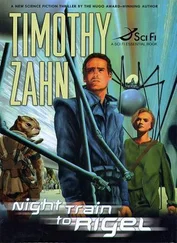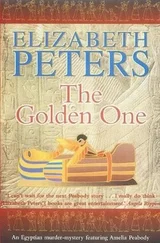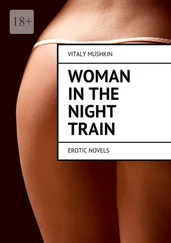Silently I returned it to her. I had never seen anything I coveted more.
‘It’s nice, isn’t it?’ Casually she replaced the earring.
‘Gorgeous.’
‘He asked if I’d rather have diamonds,’ Mary said innocently. ‘But I prefer these. He has such wonderful taste.’
‘Uh-huh,’ I said. The enamelled golden rose, invisible under my blouse, seemed to burn into my hide.
‘There he is.’ Mary looked past me. ‘I guess it’s time to dress for dinner. I’m so glad we had this talk, Vicky.’
She didn’t ask me to join them. I watched her hurry towards him; he stood waiting, arms folded, like the Emperor preparing to receive a humble subject, and then I turned to go – the other way.
There was no warning, not even a rush of running feet. He hit me hard and low, hurling me forward. I bounced off the rail with a force that knocked the breath out of me and crashed to the deck, derriere first, the back of my head a close second. Bright specks darted through the blackness like pretty little shooting stars.
After a while I opened my eyes, and immediately closed them again when I saw a familiar face hovering over me. Then I opened them again. Not that familiar. It was Foggington-Smythe.
‘Good old Perry,’ I croaked.
‘Good,’ said good old Perry. ‘You know me. You’d better lie still, though; that was quite a crack on the head.’
‘She’s not got concussion.’ John was sitting on the deck next to me. He was rubbing his wrist and scowling like a gargoyle on a cathedral. ‘I think I broke my arm,’ he went on bitterly.
‘Of course,’ I said. ‘You were the one who knocked me down. I should have known.’
‘I think I broke my arm,’ John repeated.
It was like old times, me bruised and prostrate, John whining. ‘God damn it, what’d you do that for?’ I demanded. I sat up and then grabbed the back of my head. ‘Ow.’
Perry put a manly arm around my shoulders and squeezed. ‘Ow,’ I said again.
‘I’ll carry you to the infirmary,’ Perry aunounced.
‘No, you won’t. I don’t have a concussion.’ I indicated John, who was still nursing his arm. ‘Carry him. I’ll take his feet. We can drop him, heavily, several times along the way.’
The corner of John’s mouth twitched, but he said nothing. I saw Mary, pressed up against the rail, her hands over her mouth, her eyes wide and horrified. I saw the spattered dirt and fragments of pottery and the broken remains of the jasmine that had been in the pot. It had hit the deck in the exact spot where I would have been standing if someone hadn’t knocked me out of the way.
‘Oh,’ I said.
‘Vicky, don’t be angry with him.’ Mary knelt beside me and put her arm around me, from the other side. A pretty tableau we must have made. ‘It was my fault, I saw the flowerpot tottering on the edge and cried out. John acted instinctively, as any gentleman would.’
I glowered at John. His eyelids fell, but not in time to hide the fury that had darkened his eyes to sapphire. I wasn’t moved to apologize; at that point I wouldn’t have given him credit for good intentions if the testimonial had come from the pope. ‘Oh, right,’ I snarled. ‘Thanks a lot. My head hurts worse than it would have done if that little bitty pot had landed on it and I’ve got a bruise on my bum the size of a soup tureen.’
‘It might have hurt you badly, Vicky,’ Mary insisted.
I staggered to my feet, assisted by Perry. ‘Worse than this? Oh, well. I guess I’ll live. Excuse me. I’ve got to shower and change and find out who tried to brain me.’
‘You aren’t implying that it was deliberate, I hope,’ Perry exclaimed.
‘An unfortunate accident,’ said John. ‘Or a warning.’
‘Warning?’ Perry repeated, staring.
‘To enjoy life to the full while one can,’ John said sententiously. ‘“Gather ye rosebuds while ye may.” This is a world fraught with peril; one never knows when the axe will fall. Life is at best – ’
‘Darling, please.’ Mary abandoned me and hurried to take his arm. ‘Vicky will think you’re making fun of her.’
‘Oh, she’d never be mistaken about that,’ John said.
‘Never,’ I agreed, and let Perry lead me away.
Chapter Four

I
TERRORISTS, LOW WATER, or whatever, the change in schedule couldn’t have been more welcome. It would give me a chance to collect my wits and nurse my bruises. I had exaggerated a trifle; the one on my butt was only the size of a salad plate. As I lowered myself very gently into a hot tub filled with bubbles I tried to look on the bright side.
The flowerpot wasn’t a lethal weapon; even if it had landed square on the top of my head it wouldn’t have done lasting damage. As John had uunecessarily and condescendingly emphasized, it had been meant as a warning. Not that there were certain individuals on the ship who wanted me off the ship – I had already known that – or even that they were willing to use violence to achieve that end. It was a little more subtle: a reminder that I wasn’t safe anywhere on the boat, that ‘they’ had access even to my room. That was where I had been standing when the pot fell – under my own balcony.
Too damn many people had access to my room. I let my toes float up to the surface of the water and studied them pensively, remembering the agitated faces of the staff members who had been interrogated. Perry had insisted I report the incident immediately, and Hamid, the purser, had hauled the obvious suspects into his office.
Hamid was in charge of the domestic arrangements on the boat, the civilian equivalent of the captain. A slim, handsome man of indeterminate age, he radiated an air of calm competence. I had already wondered if he might be Burckhardt’s mysterious agent; he had keys to all the rooms and a perfect excuse to enter them. He could always claim he was checking up on his staff.
If he was in disguise, the disguise was excellent. In his crisp, tailored uniform, his hair greying attractively at the temples, he was the perfect model of an efficient hotel manager. And, I reminded myself, he wasn’t the only one who had a key to my room. Until that moment I hadn’t realized how many stewards there were. One replenished the liquor cabinet (he was a Copt, since handling alcoholic beverages might have offended Muslim sensibilities); another picked up and delivered laundry; a third cleaned and changed the beds. Hamid lined them up in a cringing row and questioned them in vehement Arabic. They protested their innocence volubly and passionately. The most obvious suspect was a kid named Ali, who was responsible for the overall cleaning, including the care of the flowers. He looked no more than eighteen – a graceful, smiling boy with the thick dark lashes many Egyptians have. He denied everything. Yes, he had watered the flowers and clipped the dead blooms; everything had been in perfect order when he left the room, he had made certain to replace the pots securely in the stand. He wrung his hands. Then he started to cry.
That was when I put an end to the proceedings. They were a waste of time, and I can’t stand masculine tears. Ali cried even harder when I said I didn’t blame him.
Hamid and Perry went with me to my room. As I had begun to suspect, there was nothing wrong with the flowers on my balcony. Every pot was still in place and firmly anchored.
The most logical explanation, proposed by a visibly relieved Hamid, was that one of the passengers in an adjoining room had been fooling around with the flowers. He would investigate, of course . . . I said fine, and got rid of him and Perry. He wouldn’t investigate very hard, not with this lot of passengers, and I knew perfectly well that the pot had fallen from my balcony even it it hadn’t originated there.
Читать дальше









